Related Research Articles
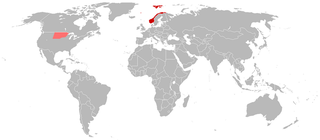
Norwegian is a North Germanic language spoken mainly in Norway, where it is the official language. Along with Swedish and Danish, Norwegian forms a dialect continuum of more or less mutually intelligible local and regional varieties; some Norwegian and Swedish dialects, in particular, are very close. These Scandinavian languages, together with Faroese and Icelandic as well as some extinct languages, constitute the North Germanic languages. Faroese and Icelandic are not mutually intelligible with Norwegian in their spoken form because continental Scandinavian has diverged from them. While the two Germanic languages with the greatest numbers of speakers, English and German, have close similarities with Norwegian, neither is mutually intelligible with it. Norwegian is a descendant of Old Norse, the common language of the Germanic peoples living in Scandinavia during the Viking Era.
Reich is a German word analogous in meaning to the English word "realm". The terms Kaiserreich and Königreich are used in German to refer to empires and kingdoms respectively. The Cambridge Advanced Learner's Dictionary indicates that in English usage, the term "the Reich" refers to "Germany during the period of Nazi control from 1933 to 1945".
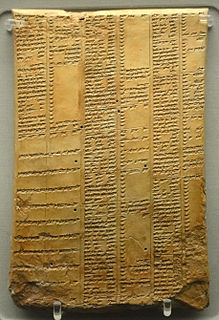
A synonym is a word, morpheme, or phrase that means exactly or nearly the same as another word, morpheme, or phrase in the same language. For example, the words begin, start, commence, and initiate are all synonyms of one another; they are synonymous. The standard test for synonymy is substitution: one form can be replaced by another in a sentence without changing its meaning. Words are considered synonymous in one particular sense: for example, long and extended in the context long time or extended time are synonymous, but long cannot be used in the phrase extended family. Synonyms with exactly the same meaning share a seme or denotational sememe, whereas those with inexactly similar meanings share a broader denotational or connotational sememe and thus overlap within a semantic field. The former are sometimes called cognitive synonyms and the latter, near-synonyms, plesionyms or poecilonyms.
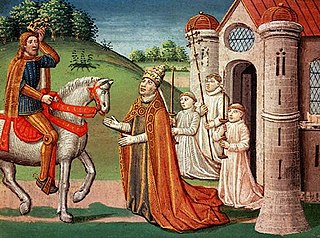
Charles is a masculine given name predominantly found in English and French speaking countries. It is from the French form Charles of a Germanic name Karl. The original Anglo-Saxon was Ċearl or Ċeorl, as the name of King Cearl of Mercia, that disappeared after the Norman conquest of England.

The Norsemen were a North Germanic ethnolinguistic group of the Early Middle Ages, during which they spoke Old Norse language. The language belongs to the North Germanic branch of the Indo-European languages and is the predecessor of the modern Germanic languages of Scandinavia. During the late 8th century, Norsemen embarked on a large-scale expansion in all directions, giving rise to the Viking Age. In English-language scholarship since the 19th century, Norse seafaring traders, settlers and warriors have commonly been referred to as Vikings. The identity of Norsemen derived into their modern descendants, the Danes, Icelanders, Faroe Islanders, Norwegians, and Swedes, who are now generally referred to as 'Scandinavians' rather than Norsemen.
"Bey" is a Turkish title for chieftain, traditionally applied to the leaders or rulers of various sized areas in the Ottoman Empire. The feminine equivalent title was Begum. The regions or provinces where "beys" ruled or which they administered were called beylik, roughly meaning "khanate", "emirate" or "principality" in the first case and "province" or "governorate" in the second.

William is a popular given name of an old Germanic origin. It became very popular in the English language after the Norman conquest of England in 1066, and remained so throughout the Middle Ages and into the modern era. It is sometimes abbreviated "Wm." Shortened familiar versions in English include Will, Willy, Willie, Bill, and Billy. A common Irish form is Liam. Scottish diminutives include Wull, Willie or Wullie. Female forms are Willa, Willemina, Willamette, Wilma and Wilhelmina.
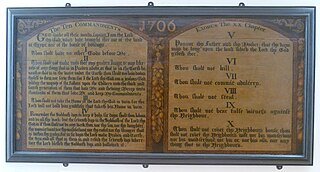
Kirk is a Scottish word meaning "church", or more specifically the Church of Scotland. Many place names and personal names are also derived from it.

Smith is a surname originating in England. It is the most prevalent surname in the United Kingdom, Australia, Canada, New Zealand and the United States, and the fifth most common surname in the Republic of Ireland. The surname Smith is particularly prevalent among those of English, Scottish and Irish descent, but is also a common surname among African Americans, which can be attributed either to black slaves being given the surname during slavery and never changing the name upon the end of the era of slavery and after the issuance of the Emancipation Proclamation or to descendants of interracial marriages. 2,442,977 Americans shared the surname Smith during the 2010 census, and more than 500,000 people share it in the United Kingdom. At the turn of the 20th century, the surname was sufficiently prevalent in England to have prompted the statement: "Common to every village in England, north, south, east and west"; and sufficiently common on the (European) continent to be "common in most countries of Europe".
Reginald is a masculine given name in the English language.

Laurentius is a Latin given name and surname that means "From Laurentum" . It is possible that the place name Laurentum is derived from the Latin laurus ("laurel"). The name can also be derived from the Old Greek word Lavrenti meaning "bright one, shining one". People with the name include:
Dutch names consist of one or more given names and a surname. The given name is usually gender-specific.
Many words that existed in Old English did not survive into Modern English. There are also many words in Modern English that bear little or no resemblance in meaning to their Old English etymons. Some linguists estimate that as much as 80 percent of the lexicon of Old English was lost by the end of the Middle English period, including many compound words, e.g. bōchūs, yet the components 'book' and 'house' were kept. Certain categories of words seem to have been more susceptible. Nearly all words relating to sexual intercourse and sexual organs as well as "impolite" words for bodily functions were ignored in favor of words borrowed from Latin or Ancient Greek. The Old English synonyms are now mostly either extinct or considered crude or vulgar, such as arse/ass.

Moore is a popular English-language surname. It is the 34th most common surname in Australia, 32nd most common in England, and was the 16th most common surname in the United States in 2000.
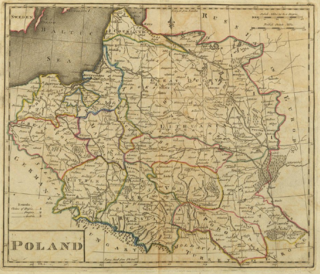
The ethnonyms for the Poles (people) and Poland include endonyms and exonyms. Endonyms and most exonyms for Poles and Poland are usually associated to derive from the name of the Lechitic tribe of Western Polans (Polanie), also stated by some sources has been the association in some languages for the exonyms for Poland to derive from the name of another tribe – the Lendians (Lędzianie).

Katherine, Catherine, and other variations are feminine names. They are popular in Christian countries because of their derivation from the name of one of the first Christian saints, Catherine of Alexandria.
Germanic given names are traditionally dithematic; that is, they are formed from two elements, by joining a prefix and a suffix. For example, King Æþelred's (Ethelred's) name was derived from æþele, for "noble", and ræd, for "counsel".
The name Weeks is a non common English surname, usually either a patronymic of the Middle English Wikke or a topographic or occupational name deriving from Wick. It may also be an Anglification of the Scandinavian habitational name Vik.

North Germanic peoples, commonly called Scandinavians, Nordic peoples and in a medieval context Norsemen, are a Germanic ethnolinguistic group of the Nordic countries. They are identified by their cultural similarities, common ancestry and common use of the Proto-Norse language from around 200 AD, a language that around 800 AD became the Old Norse language, which in turn later became the North Germanic languages of today.
References
- Patrick Hanks, editor. (2003), Dictionary of American Family Names, Oxford University Press, ISBN 0-19-508137-4
- Statistics Sweden